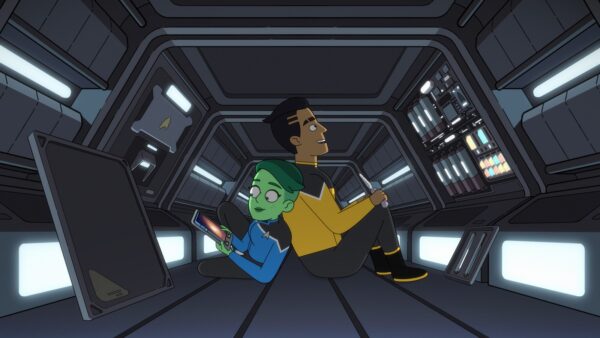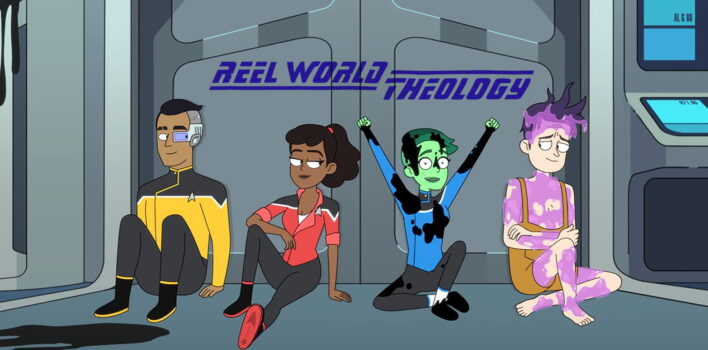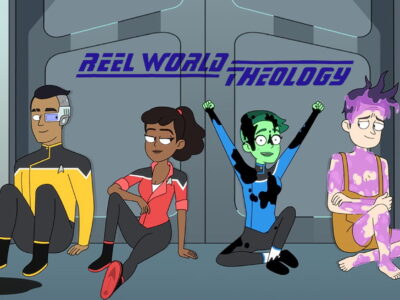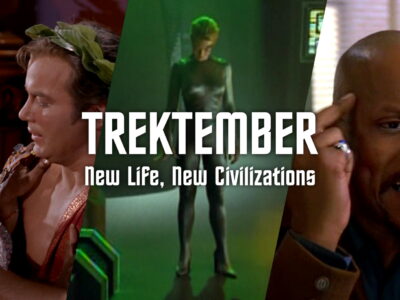“Envoys” – Star Trek: Lower Decks S1E02
 Encouragement is in short supply in 2020—make that the 21st century thus far. That’s a tough statement to argue with, even if you don’t find it a laughable understatement. In a world that feels like it’s falling apart, the worst part is probably that the people who should be rallying together are fighting one another instead of allying themselves against the greater problems.
Encouragement is in short supply in 2020—make that the 21st century thus far. That’s a tough statement to argue with, even if you don’t find it a laughable understatement. In a world that feels like it’s falling apart, the worst part is probably that the people who should be rallying together are fighting one another instead of allying themselves against the greater problems.
Maybe that’s why episode 2 of Lower Decks packed such a punch for me: while “Envoys” certainly doesn’t wear rose-colored glasses, its overall theme of people helping others was heart-warmingly…well, encouraging. And I don’t even mean “helping” in the sense of “saving the galaxy” or “defeating the Dominion;” Mariner, Boimler, Rutherford, and Tendi’s problems and solutions are much more relatable.
So it’s either that, or the fact that Mariner has dreams about being Khan Noonien Singh. Kind of a tossup, really.
I found “Envoys” to have more heart and be more well-paced than “Second Contact.” As before, the core of the story draws its energy from the fact that it’s a particularly human story; but this time it turns headlong into a more classically-Trek heartwarming and unified tale of mutual introspection and human exploration.
Still, what’s an episode of Star Trek without some adventure?
Spoiler warning: plot and ending details for “Envoys” follow.
We start in familiar territory with this episode. After a chuckleworthy cold open featuring a classic Trek staple (a malevolent energy being infiltrating the ship), we’re off to the races. Boimler has scored a prestigious duty, shuttling a Klingon dignitary to the planet’s surface, and Rutherford is in a quandary about his work/life balance.
But while Mariner originally seems to join Boimler’s mission to make fun of the Lower Decks’ resident “try-hard,” it turns out that she’s actually an old friend of the warrior (“we’re, like, the same age. Back in what ‘day?’”) and has come along, in part, to make sure that neither man makes a fool of himself. And a host of expected conflicts between Rutherford and Tendi, his coworkers, and almost the entire senior staff is revealed to be nothing more than an internal conflict. Throughout the episode, the entire crew is unfailingly and even shockingly supportive of one another.
We get our first taste of this theme when Ensign Rutherford asks for a transfer from the chief engineer: the show initially uses the expectations and narrative shorthand of conflict to tease passive-aggression (or even outright aggression) for the move, but Commander Billups subverts those expectations with affirmation and encouragement. We’re certain it’s coming in a similar situation with Lieutenant Shaxs, but again the security chief encourages Rutherford’s skill and sends him on his way. Commander Ransom declines to rebuke Rutherford’s poor performance in the bridge simulator. Even the ascerbic Dr. T’Ana compliments Rutherford’s skill at surgery before sending Ensign Tendi to take over.
No matter what color uniform Rutherford puts on, he’s respected and encouraged in his career exploration; and in the end, both he and Tendi are supportive of one another’s interests and aspirations as they watch the Trivoli Pulsar on a PADD from deep within the bowels of the Cerritos’ Jefferies Tubes.
“Are you saying what I think you’re saying, Ensign?”
“Uh…I’d like to request a transfer out of Engineering…?”
“Consider your request…granted! Ha ha, oh man, this is exciting! I’m sure wherever you end up, they’ll be lucky to have you.”
—Billups and Rutherford, “Envoys”
Ensigns Boimler and Mariner butt heads somewhat more on their mission to Tulgana IV, starting when Mariner spends the entire trip getting K’orin drunk on bloodwine; but even when a drunk K’orin shuttlejacks the Yosemite, Mariner works to calm the high-strung Boimler (though admittedly she’d have been more effective had she actually read the mission briefing) who is justifiably worried that the two of them will end up kicking alien knees on Rura Penthe. She tries to calm him further after he fails to smooth things over with the angry Taxor, though her reassurances and “NBD” attitude again falls on deaf (and tense) ears.
And when she ends the bar fight he started, she doesn’t rake him over the coals for failing (it helps he’s already doing that enough on his own); she encourages him in his own particular skills and abilities. His final negative reaction and insistence that he’s going to leave Starfleet is the impetus she needs to pick up his comm badge and cook up a sneaky plan. His confidence restored, Boimler even supports Mariner’s less-than-Starfleet plan to ding-dong-ditch K’orin at the front door to the Federation Embassy. And back on the ship, she endures his public ribbing (and even that feels like it’s delivered in love; he readily admits that she was a “badass” all day before the Ferengi incident) before Mariner reveals that the Ferengi threat was all her idea—an act to get Boimler back to normal.
“Freeze program. In thousands of simulations, that’s—literally—never happened before. Let’s try another one!”
—Ransom, “Envoys”
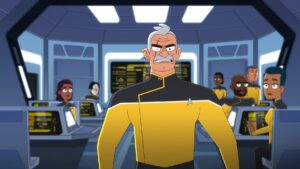 If this were set in a modern context, all of this mutual support and encouragement might feel a little Pollyannaish; it certainly plays into Gene Roddenberry’s infamous “no inter-Starfleet conflict” edict from the beginning of The Next Generation. But especially when delivered almost entirely through subtext, interspersed with jokes, and set on a dangerous world, the whole episode actually seems to fit with what we know of 24th-century Starfleet values. Jake Sisko’s rejection of his father’s career path comes to mind, as well as the high expectations and high esteem for the crew in the original “Lower Decks” from TNG season 7. Whenever someone in the Federation needs help and support, they get it.
If this were set in a modern context, all of this mutual support and encouragement might feel a little Pollyannaish; it certainly plays into Gene Roddenberry’s infamous “no inter-Starfleet conflict” edict from the beginning of The Next Generation. But especially when delivered almost entirely through subtext, interspersed with jokes, and set on a dangerous world, the whole episode actually seems to fit with what we know of 24th-century Starfleet values. Jake Sisko’s rejection of his father’s career path comes to mind, as well as the high expectations and high esteem for the crew in the original “Lower Decks” from TNG season 7. Whenever someone in the Federation needs help and support, they get it.
But where does all of this mutual esteem and encouragement come from? It’s like Mr. Rogers wrote the “interpersonal conduct” manual for Starfleet officers. But I don’t think it’s out of nowhere.
“This all sounds fun, but…not for me. I’d like permission to leave the ‘Bear Pack.’”
“Rutherford, that is…outstanding! Gotta be true to yourself. Am I right, bears? Hoo-rah!”
—Rutherford and Shaxs, “Envoys”
Star Trek makes it clear on many occasions that the Federation is on a clear, concise, consistent mission: one of exploration, altruism, knowledge, and peace. Everyone in Starfleet, especially, is on that mission; and a common mission unites people in surprising, even supernatural ways. We’ve seen it in real life with the US/Soviet Space Race in the middle of the 20th century, and in wars and conflicts around the world before and since. Having a common enemy is one way to see this played out, but it doesn’t need to be antagonistic; when people are motivated by something bigger, something more than themselves, we can come together to do some awesome things—and support each other along the way.
It’s one of the most endearing and enduring parts of the way God wired us; to be in the corner of the people we’re on mission with. And seeing it so well-depicted in fiction should challenge Christians in particular to emulate those values even more among one another than the world does; we should be unfailingly supportive of one another, consistently finding those who need encouragement and binding up their weaknesses.
Because we are all on a common mission. Because that mission is greater than any of us. But most of all, because we were first encouraged and bound up by Christ. “[God] comforts us in all our affliction,” Paul says in 2 Corinthians 1:3-4, “so that we may be able to comfort those who are in any affliction, with the comfort with which we ourselves are comforted by God.” It’s a challenge we’ve been empowered for; whether those “afflictions” turn out to be a misplaced Klingon or something more ordinary.
